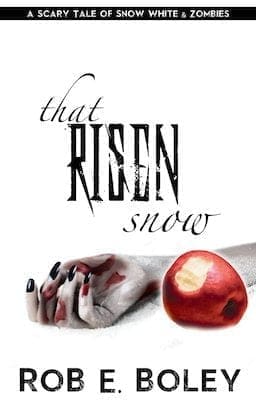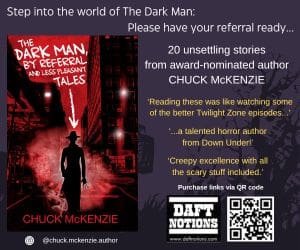‘That Risen Snow’ Blog Tour – Embracing the Dark Side of Magic
 Guest Post by Rob E. Boley
Guest Post by Rob E. Boley
“Magic’s just science that we don’t understand yet.”
— Arthur C. Clarke
Most of my horror stories could be called dark fantasy, which—in the broadest definition of the term—means they have elements of both horror and the supernatural. My simple definition of dark fantasy is this: Something scary happens, and something otherworldly happens, and maybe they happen at the same time.
In any case, a good portion of horror stories have some uncanny element, that for the sake of argument we’ll call magic. Be they vampires, other dimensions, ghosts, zombies, time travel, possessed cars, mind-reading, ancient spirits, or were-hamsters, these are all supernatural elements that could be considered magic. They’re unreal, and yet as writers it is our job to convince the reader to suspend their disbelief and imagine this magic to be real.
To do this, you may find it helpful—to borrow a page from Arthur C. Clarke’s book—to portray magic as misunderstood science. In other words, think about how our own technology works, and apply those same concepts to your magic.
With Great Power Comes A Great Power Source
Magic has a cost. Period. It can’t be free. There’s nothing more boring than a character who can simply utter a few words, shake a mystical stick, and—BIF, BAM, BOOM—generate a much-needed lightning bolt when it’s needed most. Just like a car needs fuel or a cell phone needs a charged battery, your magic needs a power source.
A great example is the magic used in Laini Taylor’s Daughter of Smoke & Bone series. The chimaera can resurrect their dead, but must pay a tithe with their own suffering. Alternately, a great tech example is those damn dilithium crystals from Star Trek. Sure, the crew had some amazing tech at their disposal, but the Enterprise was virtually worthless without its power source.
Having a cost for power makes things harder for your characters. It creates tension, and that will—wait for it—fuel your narrative.
Magic’s Flabby Belly and Nagging Cough
Realistic magic, like technology, has unexpected consequences. Think about the automobile. It’s a wonderful invention that lets us cover the distance between Point A and Slot B in a matter of minutes. Wonderful, right?
Except it’s not without problems. We once walked that same distance, and now we don’t. Guess what? Now we have a serious obesity problem. Oh, and those cars emit all manner of pollution into the air. So, sure, we’re fat and it’s hard to breath, but by gawd we’re going places fast!
Think of your magic in the same regard. If your character has the ability to teleport, give that power some unexpected consequences. Maybe she pops out of her clothes every time she teleports. Maybe she teleports every time she gets physically excited, making it impossible for her to get past the foreplay stage of intimacy. Maybe the process of teleporting scrambles her neural pathways, affecting her memories. Maybe on an emotional level it makes her unable to face even the slightest of conflicts. Why confront problems when you can simply blink away?
All Your Home Base Are Belong to Us
The other day, my daughter was talking about how frustrating it is to play tag with little kids, because whenever she’s about to tag them, they grab the nearest thing and call it home base. The rules are always changing and there’s no real challenge.
Well, unconvincing magic works the same damn way, and is every bit as frustrating for the reader. To be believable, magic needs rules and limitations, and you can’t make them up as you go along, otherwise it just becomes a Get Out of Jail Free card for your characters. Remember, you want to make things harder for your beloved little darlings.
So, maybe you have a character who can talk to the dead, which is an awesome magical power. But give that supernatural ability some rules and limits. Maybe she can only do it when she’s alone. Or when it’s nighttime. Or when she reveals some deep dark secret. Or when she’s drunk on cheap wine coolers. Establish these rules and enforce them.
Is that Magic in Your Pocket or Are You Happy to See Me?
Finally, magic should have a life of its own. It may be created for one purpose, but it should rapidly evolve in unexpected new ways. Think about that little magical rectangle in your pocket. When Martin Cooper invented the first handheld mobile phone in 1973, do you really think he envisioned how that device would change our world?
Think about how many minutes a week you spend texting. Or how easy it is now to find out the weather. Or how much information is at your fingertips. Or how many real-life interactions you don’t have out in public because you’re chattering away on your cell. Think about all the stuff you don’t have to pack now when you travel—directions, a camera, film, books, music, and so on—because it’s all on your phone.
It’s not even really a phone anymore. I barely ever use mine to talk to another human being, but I am almost constantly using it. The cell phone has outgrown its original purpose to become something infinitely more powerful. Likewise, in my series, The Scary Tales, Queen Adara conjures a magic apple to cast a curse on Snow White. But guess what? The curse gets away from her. It grows into something else. Something unexpected. And when the Prince kisses Snow to end the curse, she wakes up, but she doesn’t wake up right.
The curse goes viral, and rabid zombie hijinx ensue. Except as the series progress, the curse grows even worse. It starts with rabid zombies then evolves into shambling ghouls. Next come skeletal corpses rising from their graves. Soon, the skeletons reassemble into bizarre new creations.
It only ever gets worse, and your magic should do the same. Your characters will hate you but your readers will love you. And guess which one buys your books?
About the Author:
 Rob E. Boley is the author of The Scary Tales series of novels, featuring mash-ups of your favorite fairy tale characters and classic horror monsters. He grew up in Enon, Ohio, a little town with a big Indian mound. He later earned a B.A. and M.A. in English from Wright State University in Dayton, Ohio. Aside from The Scary Tales series, his fiction has appeared in several markets, including A cappella Zoo, Pseudopod, Clackamas Literary Review, and Best New Werewolf Tales. His stories have won Best in Show in the Sinclair Community College Creative Writing Contest and the Dayton Daily News/Antioch Writers’ Workshop Short Story Contest. He lives with his daughter in Dayton, where he works for his alma mater. Each morning and most nights, he enjoys making blank pages darker.
Rob E. Boley is the author of The Scary Tales series of novels, featuring mash-ups of your favorite fairy tale characters and classic horror monsters. He grew up in Enon, Ohio, a little town with a big Indian mound. He later earned a B.A. and M.A. in English from Wright State University in Dayton, Ohio. Aside from The Scary Tales series, his fiction has appeared in several markets, including A cappella Zoo, Pseudopod, Clackamas Literary Review, and Best New Werewolf Tales. His stories have won Best in Show in the Sinclair Community College Creative Writing Contest and the Dayton Daily News/Antioch Writers’ Workshop Short Story Contest. He lives with his daughter in Dayton, where he works for his alma mater. Each morning and most nights, he enjoys making blank pages darker.
Author Website:
Sign up for Rob E. Boley’s REBolution E-newsletter and receive a free short story:
http://www.robboley.com/freestory/
Download a free copy of That Risen Snow from Amazon by clicking here.
Buy a print copy of That Risen Snow by clicking here.
- About the Author
- Latest Posts
Stuart Conover is a father, husband, published author, blogger, geek, entrepreneur, horror fanatic, and runs a few websites including Horror Tree!











Great post.
“Maybe she teleports every time she gets physically excited, making it impossible for her to get past the foreplay stage of intimacy.” That might be one of the funniest consequences of magic that I’ve ever read. You, sir, should write the crap out of that.
I think it’s worth pointing out that you don’t need to state the rules of your magic explicitly, especially if your POV character doesn’t use any. Take Gandalf, for example. His magic is in the mysterious realm of unexplained miracles, but in using it to halt the Balrog, he’s immediately cut from the story. There’s some balance that’s been tipped, and the balance claims his life to return.
Even though we don’t know exactly how Gandalf’s magic works, we know it involves a cost that makes him hesitant to use it unless it’s absolutely necessary. That makes us trust him when he doesn’t use it to, say, obliterate a whole army of orcs carrying swords and axes.
In the Wheel of Time series, Robert Jordan’s characters who are able to use the world’s magic can also sense it being used by other characters. That makes it a tactical problem to use it when you want to stay hidden from your enemies, and characters have to constantly consider this and weigh it against the downside of NOT using it. That makes for some of the most exciting moments in the series.
Cheers!